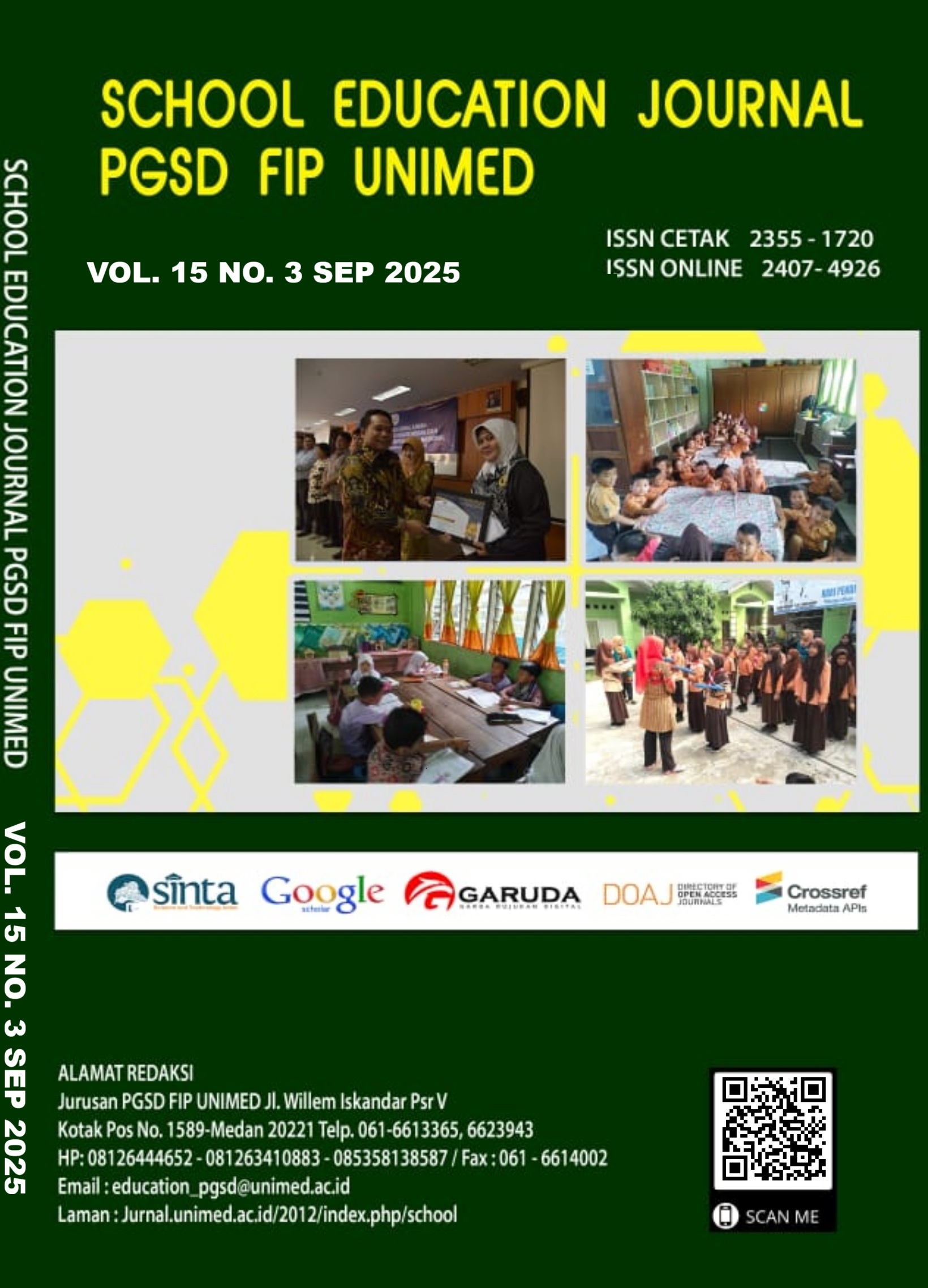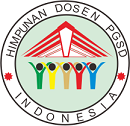PENGARUH MODEL QUANTUM TEACHING BERBASIS MEDIA DIGITAL TERHADAP HASIL BELAJAR SISWA PADA MATA PELAJARAN MATEMATIKA KELAS V
DOI:
https://doi.org/10.24114/sejpgsd.v15i3.66893Keywords:
Quantum Teaching, Digital Media, Student Learning OutcomesAbstract
This study aims to determine the This study aims to determine the effect of the Quantum Teaching model on student learning outcomes in Mathematics subjects in Class VA of SD Negeri 067245 Medan Selayang in the 2024/2025 Academic Year. The research method used is an experimental method with a quantitative research type. To obtain the required data, a test instrument of 20 questions and a questionnaire of 25 items were used. The number of research samples was 25 students based on random sampling technique. To find out the initial ability of students, the study conducted a Pretest with an average score of 42.8 which was included in the failed category. The results of the Pretest had an increase from the results of the Posttest given previously with an average student score reaching 84.8 with a very good category. It can be said that the level of success of student learning outcomes using the Quantum Teaching model increased and had a strong effect, as evidenced by the results of the correlation coefficient test calculation obtained r_count ≥ r_table with a result of 0.728 ≥ 0.380. Furthermore, the hypothesis test compares the value of t_count ≥ t_table. The value of t_count = 5.097 while t_table = 1.708. Because t_count ≥ t_table (5.097 ≥ 1.708) then H_a is accepted and H_o is rejected. Through the t-test, it can be concluded that there is a significant positive influence between the Quantum Teaching learning model (X) on student learning outcomes (Y).References
Alhakiki, A., & Taufina, T. (2020). Pengaruh Quantum Teaching Kerangka TANDUR Terhadap Hasil Belajar Matematika di Sekolah Dasar. Jurnal Basicedu, 4(3). https://doi.org/10.31004/basicedu.v4i3.395
Arikunto, S. (2023). Prosedur Penelitian Suatu Pendekatan Praktik (Arikunto Suharsimi, Ed.; 14th ed.). Bandung: Rineka Cipta.
Handayani, K., Tobing, E. N., Raharjo, S., & Bilda, W. (2025). Implimentasi Pembelajaran Matematika Dengan Pendekatan STEAM Untuk Meningkatan Kreativitas Siswa. Jurnal Pendidikan Kreativitas Pembelajaran, 07(1). https://journalpedia.com/1/index.php/jpkp
Kinasih Sedyo, W., & Wijayanti Dewi, M. (2024). Urgensi Kompetensi PenguasaanTeknologi Digital Guru Sebagai Upaya Pemaksimalan Kosakata Siswa Dalam Pembelajaran Bahasa Inggris di Sekolah Dasar. Conference Series, 7(3). https://jurnal.uns.ac.id/shes
Kuntari, S. (2023). Pemanfaatan Media Digital dalam Pembelajaran. Prosiding Seminar Nasional Fakultas Tarbiyah Dan Ilmu Keguruan IAIM Sinjai, 2, 90–94. https://doi.org/10.47435/sentikjar.v2i0.1826
Nahar, S., Suhendri, Zailani, & Hardivizon. (2022). Improving Students’ Collaboration Thinking Skill under the Implementation of the Quantum Teaching Model. International Journal of Instruction, 15(3), 451–464. https://doi.org/10.29333/iji.2022.15325a
Nur Alifah, H., Virgianti, U., Imam Zamah Sarin, M., Amirul Hasan, D., Fakhriyah, F., & Aditia Ismaya, E. (2023). Systematic Literature Review: Pengaruh Media Pembelajaran Digital pada Pembelajaran Tematik Terhadap Hasil Belajar Siswa SD. Jurnal Ilmiah Dan Karya Mahasiswa, 1(3), 103–115. https://doi.org/10.54066/jikma-itb.v1i3.463
Nursalam, M., HS, E. F., & Jusmawati, J. (2021). Efektifitas Model Quantum Teaching Terhadap Pembelajaran Matematika Siswa di Sekolah Dasar. Jurnal Basicedu, 5(2). https://doi.org/10.31004/basicedu.v5i2.724
Pratama, A. F. (2018). Penerapan Model Pembelajaran Quantum Teaching melalui Strategi Tandur untuk Meningkatkan Kompetensi Kognisi Siswa. Jurnal Edukasi (Ekonomi, Pendidikan Dan Akuntansi), 6(1), 183–192. https://doi.org/10.25157/je.v6i1.1681
Pratiwi, R., & Aisyah, S. (2025). Pengaruh Model Pembelajaran Inkuiri Terhadap Hasil Belajar Seni Rupa Materi Seni Grafis Siswa Kelas VII di SMP Negeri 3 Kinal. Jurnal Pendidikan Dan Ilmu Sosial, 7(1), 14–24. https://ejournal.stitpn.ac.id/index.php/pens
Ramadhan Muhamad, Febrianto Priyono, & Siswoyo Andika. (2024). Pengaruh Model Quantum Teaching Berbantuan Media Lagu Terhadap Hasil Belajar Mata Pelajaran IPAS kelas IV SDN Medokan Semampir I Surabaya. BADA’A: Jurnal Ilmiah Pendidikan Dasar, 6(1), 96–106. https://doi.org/10.37216/badaa.v6i1.1420
Slameto. (2022). Belajar Dan Faktor-Faktor Yang Mempengaruhi (Slameto, Ed.; 7th ed.). Bandung: Rineka Cipta.
Sugiyono. (2022). Metode Penelitian Kuantitatif (Sugiyono, Ed.; 3rd ed.). Bandung: Alfabeta.
Susilana, R., & Riyana, C. (2023). Media Pembelajaran (R. Susilana & C. Riyana, Eds.). Bandung: Wacana Prima.
Tanjung, D. S., Pinem, I., Mailani, E., & Ambarwati, N. F. (2024). Penelitian Tindakan Kelas (Pertama). Jakarta: Sonpedia Publishing Indonesia.
Wahyuni, S., & Haryanti, N. (2024). Optimalisasi Kompetensi Guru Dalam Pengembangan Pembelajaran Berdiferensiasi Berbasis Media Digital. Wahana Dedikasi: Jurnal PkM Ilmu Kependidikan, 7(1), 142–154. https://doi.org/10.31851/dedikasi.v7i1.15974
Zaman, B. (2020). Quantum Teaching an Aplikasinya Dalam Pembelajaran Pendidikan Agama Islam. In Jurnal Studi Keislaman (Vol. 6, Issue 2). http://wahanaislamika.ac.id
Additional Files
Published
Issue
Section
License
Copyright (c) 2025 SCHOOL EDUCATION JOURNAL PGSD FIP UNIMED

This work is licensed under a Creative Commons Attribution-ShareAlike 4.0 International License.
Authors whose manuscripts are approved are approved as follows:
- The publication rights for all journal manuscript materials published/published on the SEJ (School Education Journal) E-Journal site are held by the editorial board with the author's knowledge (moral rights remain with the manuscript authors).
- The formal legal requirements for accessing this electronic digital journal article are subject to the terms of the Creative Commons Attribution-ShareAlike (CC BY-SA 4.0) license, which means that E-Journal SEJ (School Education Journal) has the right to store, transfer media/format, manage in the form of a database, maintain, and publish articles without asking permission from the author as long as the author's name remains as the copyright owner.
- Manuscripts published/published electronically are open access for educational, research, and library purposes.













